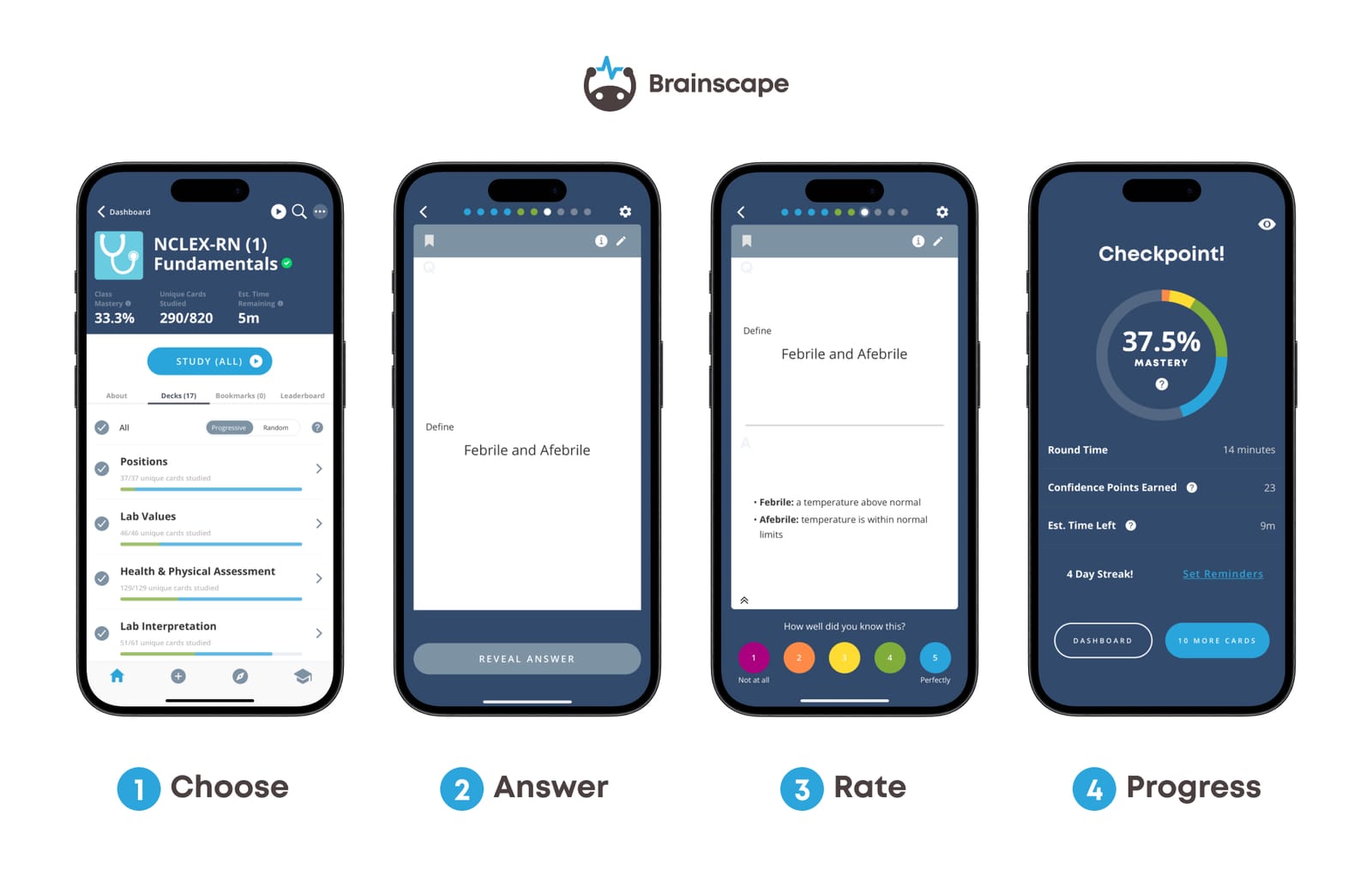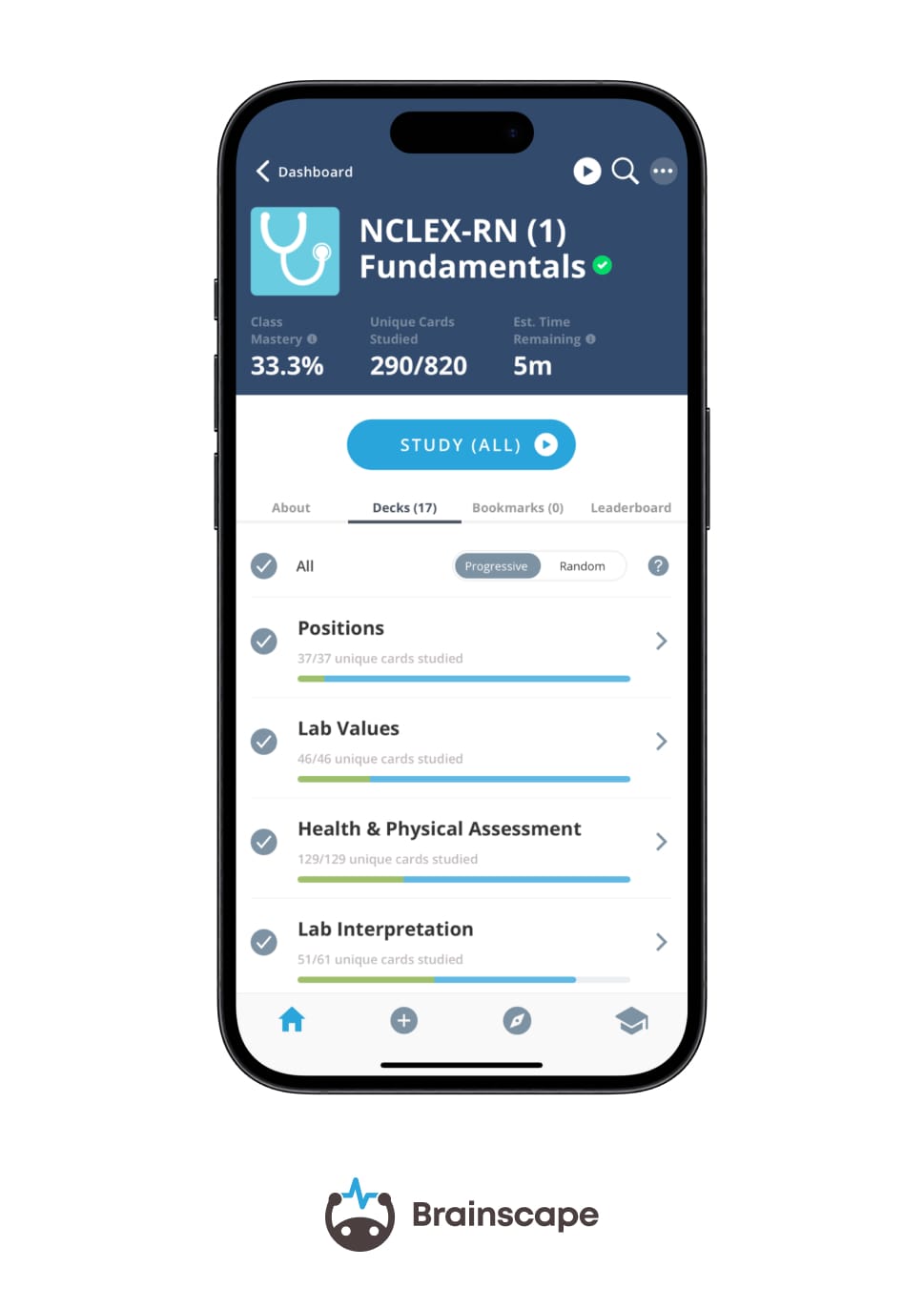Nothing makes you question your calling to become a nurse quite like failing the NCLEX or, worse still, failing the NCLEX twice … or even more, which happens to many aspiring nurses. Inevitably, the question arises: if I can’t even pass this exam, how can I handle the responsibility of caring for patients? Is this career even for me at all?
STOP. You couldn’t be more wrong.
Literally millions of people have failed the NCLEX, and most of them went on to retake it (some, many times), pass, and pursue successful and impactful careers in nursing. Yes, it feels devastating—we’re not debating that—but failing the NCLEX truly is a minor setback that you can overcome!
In this guide, we’re going to show you exactly what your next steps should be in order to get back on that proverbial horse, study efficiently, target your weaknesses, pass the NCLEX, and ride off into the sunset of a glorious nursing career!
Why Did I Fail The NCLEX?
We’ve said it before, but it’s worth saying again: failing the NCLEX really sucks. The disappointment alone could quite easily condemn you to the couch for a whole week, with nothing more than a 32-ounce ice cream tub and a wilted bamboo palm to keep you company (and you know how hard it is to kill a bamboo palm).
But one of the first steps to rallying is figuring out where you went wrong so that you don’t repeat your mistakes. So, here are the main reasons nurse grads fail the NCLEX:
Reason 1: You Failed The NCLEX Because You Found It Too Hard And Complicated
If you found the NCLEX too hard, it probably means one or both of two things:
- You didn’t know the necessary content well enough, and/or
- You didn’t practice your critical thinking skills enough
“Wait a minute,” you might say, “I spent MONTHS studying for the NCLEX, and now you’re telling me I didn’t do enough?”
No, no. We’re not saying you didn’t do enough. You just may not have spent your time efficiently or studied the right way.
What the heck does that mean?
It means you might have:
- Studied in a linear fashion, progressing through the course content without dedicating much time to review, so that by the time you sat for the exam, you’d forgotten a lot of the material.
- Done a ton of practice exams and questions, but neglected to spend sufficient time working through all your answers, even the correct ones, so that you reinforce the knowledge and skills learned.
- Learned passively as opposed to actively. Active learning, like using flashcards or teaching the material to a fellow student, helps the knowledge stick so much more efficiently than passive studying, like reading through a textbook and answering multiple-choice questions.
The good news is, these are all perfectly fixable problems. If you found the NCLEX too hard, you need to spend a little more time drilling yourself on content and practicing NCLEX questions—THE RIGHT WAY—until you find them easier.
So, take a good, hard look at your study techniques and see if you’re perhaps wasting your time on inefficient methods.
Pro Tip: Use digital flashcard apps like Mochi or Brainscape to help you master all the content super efficiently and in a way that’ll make it stick for much longer!

Reason 2: You Failed The NCLEX By Waiting Too Long To Take The Test
It can be SO tempting to take a few weeks off after graduating from nursing school to just breathe, catch up with friends, and do as little as possible. But here’s the thing. Those few weeks can turn into months and before you know it, all the content that was so fresh in your brain right after your nursing finals has faded to the point where you have to learn it all over again.
And so the best way to go about things is to take the NCLEX within three months of passing nursing school. Yes, take a few days to relax and celebrate your graduation. Then, spend a week gathering together all the necessary study resources, practice tests, reading materials, flashcards, etc., and compile a robust study schedule.
Then get to work.
Every day that goes by without you studying will see you sliding further along that forgetting curve. So, stay ahead through daily content review, which you can easily do with digital flashcard apps like Anki or Brainscape. They take the guesswork out of what to study next by tracking your understanding of each concept and choosing the perfect flashcards for you to study, whenever you open the app. You can start studying with just one tap, and that's a proven motivation booster.

Reason 3: You Failed The NCLEX Because You Were Sabotaged By Anxiety
You would be truly astounded at the number of nurse graduates who are so nervous on the day of their NCLEX that they go blank or even have a panic attack and end up leaving before they’re done, quite simply because the stress is too much. We’ve even encountered stories of examinees who took prescription medications* in an effort to calm their nerves, only to arrive for the exam too woozy to concentrate!
*Not a recommendation from Brainscape.
Anxiety is a very real problem that affects almost everyone, so you’re not alone. But if yours is derailing your focus and preventing you from attacking your studies with confidence and determination, it must be addressed sooner rather than later. Make a clear study plan that you can trust, and use the most efficient study methods available so you don't have to worry about wasting time.
Pro tip: Digital flashcards have been proven to reduce anxiety and stress among medical students.
Reason 4: You Failed The NCLEX Because You Ran Out Of Time To Study
It sounds like a silly mistake to make, but exams, particularly high-stakes exams, have a nasty tendency to creep up on you. Like a saber-tooth tiger stalking a hapless caveman. Here’s how to not be a hapless cave(wo)man:
- Right at the start of your NCLEX prep, design a robust study plan that will guide you through all the necessary content memorization and skills practice so that you arrive at the exam well-prepared. (Brainscape has created these free NCLEX study planners and exam countdown sheets, which you can customize to keep you on track to crush your study goals!)
- Regularly update your study plan to make more time for your key weaknesses and less time for the areas you’re confident in.
- Use efficient study techniques like digital flashcards to get more done in less time, without cramming.
- Spend time every day studying and reviewing content and practicing questions.
And finally, if you honestly don’t feel ready to take the NCLEX, don’t be afraid to reschedule the exam. The National Council of State Boards of Nursing (NCSBN) allows for changes up to 24 hours beforehand, but we’d recommend you make your decision ahead of time. A last-minute change smacks of anxiety rather than genuine unpreparedness.
Reason 5: You Failed The NCLEX Because You Wasted Time Paralyzed By Poor Decision-Making
Time management is a crucial component of doing well in any exam, but particularly the NCLEX, which tests critical thinking. You simply can’t afford to spend five or ten minutes noodling on every single question and its assortment of multiple-choice answers. And so, a part of your studying needs to be answering questions/practice exams under timed conditions.
At first, you simply want to become good at understanding the nature of NCLEX questions, what they’re asking you for, and how to answer them. Then, you want to practice, practice, practice until you’re good and FAST at reading and understanding the passage, deftly identifying the situation, and using your nursing knowledge to decide on the safest, most effective solution.
It’s like learning to play guitar. At first, your fingers are clumsy, and it takes you ages to switch between chords. With practice, however, your muscles learn the movements and memorize the positions, and your fingers become quicker and more adept at making the transitions. Before long, you’ll be playing seamlessly. The same applies to critical thinking skills. In both cases, what you need is practice.
Reason 6: You Failed The NCLEX Because You Struggled With The Critical Thinking Parts Of The Exam
The NCLEX tests your ability to think critically in any given medical situation or setting. And so, to go into the NCLEX without having practiced and honed your critical thinking and reasoning skills is like going into a gunfight with a bread knife. You ain't gonna win.
There’s really only one way to sharpen those skills, and that’s to practice; ideally, with the feedback and guidance of a tutor, mentor, or even a group of students.
Reason 7: You Failed The NCLEX Because Your Nursing School Didn’t Do A Great Job Of Preparing You For The Challenge
Not everyone has the luxury of a top nursing school education. And unfortunately, some nursing schools just don’t do a great job of preparing students to take on the NCLEX.
Sure, they teach all the necessary content and maybe give you the materials you need … but learning how to pass the NCLEX is a subject in itself, separate from the nursing content you need to understand and memorize.
So, our advice is that you take your studying into your own hands by doing your best to:
- Find a mentor, introduction, or tutor who can guide your progress,
- Participate in study groups,
- Seek out constant question and test practice as early as possible,
- Craft a detailed study schedule and stick to it, and
- Dedicate time daily to studying and reviewing.
It’s a shame but it’s true that not all nursing school programs are great at preparing their students for the NCLEX. So take responsibility for your success by using the resources provided to you by the NCSBN, your NCLEX review course, and here on the Brainscape Nursing Academy!
Reason 8: You Failed The NCLEX Because You Faced An Unfair Disadvantage
If English isn’t your first language; if you struggle to find the peace to study because you share your home with many other people; if you work full-time; if you’re juggling other responsibilities like children; and/or if you live in a dangerous area … your path to becoming a registered nurse will probably be much harder than it is for students from more privileged backgrounds.
And unfortunately, a shortage of time and the physical and mental resources to persevere could end up in disappointment for NCLEX candidates.
There’s no easy solution to these problems, but if you do find yourself saddled with an unfair disadvantage, you need to give yourself more time to prepare, shift around a few priorities, and try to get the support of friends and family while you study for your exam.
Also, the thing to remember is this: every year, thousands of students just like you overcome the language barrier, juggling several responsibilities, disadvantaged neighborhoods, and more to become licensed nurses. You can do it, too.
A Final Note On Passing The NCLEX After Failing
There are no two ways about it: the NCLEX is a monster of an exam. It’s also fairly complicated, presenting candidates with a labyrinth of possible answers. Because of this, many, many students fail the NCLEX … sometimes multiple times.
But if you use this guide to identify the reason or combination of reasons why you failed, you can change your approach and design a study schedule that will address your weaknesses and buoy you through this final obstacle in the path to becoming a registered nurse. You've got this!
**NCLEX-RN® is a registered trademark of the National Council of State Boards of Nursing (NCSBN), which neither sponsors nor endorses this product.
Additional Reading
- How to study medications for the NCLEX
- The best way to use NCLEX practice questions
- Does it matter which nursing school you attend?
References
Cole, R., McHugh, D., & Netter, F. H. (2017). Assessing emotional stress, active recall and digital spaced‐learning media in the Study of Thoracic Gross Anatomy by Medical Students. The FASEB Journal, 31(S1). https://doi.org/10.1096/fasebj.31.1_supplement.580.7
Kerfoot, B. P. (2010). Adaptive spaced education improves learning efficiency: A randomized controlled trial. Journal of Urology, 183(2), 678–681. https://doi.org/10.1016/j.juro.2009.10.005
Orbell, S., & Verplanken, B. (2010). The automatic component of habit in health behavior: Habit as cue-contingent automaticity. Health Psychology, 29(4), 374.
Scheduling. NCLEX. (n.d.-b). https://www.nclex.com/scheduling.page
Xu, J., Wu, A., Filip, C., Patel, Z., Bernstein, S. R., Tanveer, R., Syed, H., & Kotroczo, T. (2024). Active recall strategies associated with academic achievement in Young Adults: A systematic review. Journal of Affective Disorders, 354, 191–198. https://doi.org/10.1016/j.jad.2024.03.010
